Last Saturday we performed the final show of Previously Loved to its fourth sell-out audience.
The whole run was quite a drama in its own right. We collected the transit van that was to ferry the stage, props and lights from venue to venue at the height of Storm Bert. One of our performances began in the dark because of a power cut (the lights came on to a rousing cheer 20 minutes into the first half). In fact, it gave the whole evening a feeling of Dunkirk Spirit. The audience got so well behind us that we considered staging a power outage each night as part of the show.
Mastering new entrances and exits at each venue was a nerve-jangling affair for the cast. And also for the director who had to maintain her sang froid as we kept asking: ‘so, do I come on this way, now?’. At Alnwick Playhouse a few of us had to sprint the circuit of the playhouse to re-enter, unruffled, into a new scene. There were a few tight calls. I was caught in just a bra on the wrong side of the stage entrance and, after what seemed an age of desperation, resorted to scrabbling back into my discarded top. Not my finest moment! I should say I did have trousers on at all times.
A show set in a charity shop can accommodate as many clothes, props and equipment as one allows. And our stage manager had the most fantastic vision which she realised beautifully. However, as a touring set, it had its drawbacks. We packed and unpacked coathangers, a mini clothes steamer, our unwieldy mannequin Hamish, half a dozen fold-out chairs, shelves, and all the rest of the clobber, including a portable stage, again and again. And again. And - you get the picture. Think also of the stage manager having to recreate that shop at each new venue.
On the upside, who’d have thought we’d perform our show about a harried charity worker being scammed during scam awareness week? Now that’s serendipity.
Back to that last performance…
Let’s make it a good one, we whispered, as we clustered by the stage entrance waiting for the music to fade and the lights to come up. Making it ‘a good one’ is easier said than done. When you’re on stage, forces beyond determination, intention and careful preparation operate. A play may be a juggernaut that starts at A and ends at B - but the route it takes can be surprising, even to those who know it inside out.
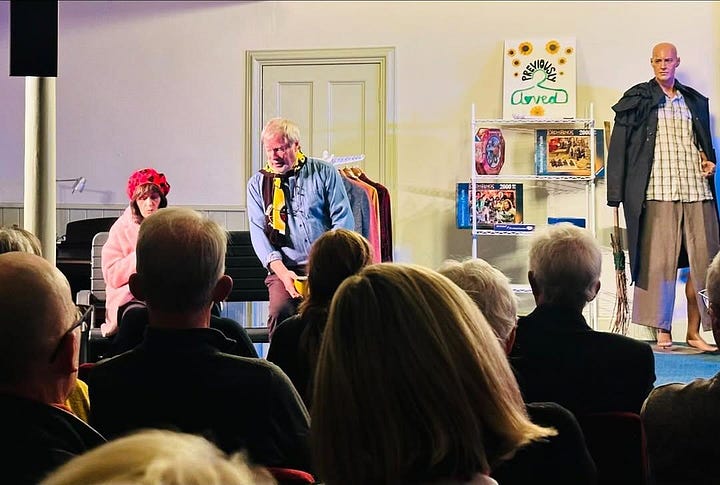

And, in truth, that final show was not our finest rendition of Previously Loved but the home-crowd audience laughed, clapped and even booed in all the right places. Because that night it was their show.
LESSON 1
The audience doesn’t know when action is in the wrong order, lines are missed, or words spoken in the wrong place at the wrong time. If you keep it real and hang on in there, the audience will go with you.
I’ve been asked quite a few times what it’s like to see your own work realised in performance.
It’s amazing:
To see life breathed into your paper-flat characters; to see the action you conceived given momentum and meaning; to see an imagined stage set created and peopled; to see tickets being bought. Yes: it is amazing.
But it’s also a huge responsibility. Will what worked in my head truly fit the stage? The director may be accountable for interpeting the material and guiding the actors. But the buck stops with the writer. The source material is mine. And we’ve all heard of shows that closed after one night (DJ Mike Read’s 2004 musical Oscar about Oscar Wilde was one - possibly divine justice to be honest…). Surely when rehearsals were underway for such shows, the cast and crew felt that same buzz and optimism that we felt as we found humour, meaning and character in our show? However, for those first-night flops, that optimism was deluded. And, presumably, that can happen to anyone?
LESSON 2
Self-doubt, nerves, anxiety all come with the territory of writing and performance - often they sharpen your reflexes, creativity and delivery. Catastrophising can become a self-indulgence. Tackle the job in hand and trust the material. If you don’t trust the material, there’s a question mark over why you took the gig - and you need to deal with that when it happens.
Members of the cast of Previously Loved shift the copious amounts of props out of our rehearsal venue ready to shift in a hired transit to our first venue: Alnwick Playhouse. Including the unwieldy body of Hamish.
A script is a living thing. If you’re a writer involved in the production of your own play, you can’t be too precious about your material. For professional copywriters, letting go of carefully crafted sentences is a super power (as is knowing when to stand your ground). In the corporate world, many, many clients consider words not as vessels of nuance and power but as something to fill the space. The precise space. If you’re told you need to slash that beautiful 50-word paragraph by 23 words to fit the box beneath the photo, you start pressing the delete button.
Of course, it is different with your own play. In a sense, you’re the commissioning editor as well as the dogsbody hack. You had the idea, worked out the structure and characters and committed it all to paper. However, the second you hand it over to a director, the power-balance shifts.
If you’re in the play, as I was, that balance becomes even more like one of those wobble boards for strengthening your ankles.
LESSON 3
If a fellow actor asks you about their character, how to deliver a line etc etc etc and you’re the writer not the director, you have to defer to the director. If the director consults with you, then you can have an opinion. But it’s difficult to keep quiet sometimes.
Fortunately the director of Previously Loved and I have worked together on previous projects. Even so, it was not always an easy ride. Because you’ve written the play, people assume you have all the answers and know all the subtext and character traits and they sometimes defer to you - which is not helpful to the director. The simple fact is that many of the elements actors are seeking guidance for are things that unfold and develop as each actor makes their character their own.
Any writer will tell you that actors (and readers) find meaning and connections in their work that they didn’t even realise they’d written. And that, of course, is one of the magical alchemies of ‘becoming’ your writing as you write.
As with any partnership, there will be things that are tricky to navigate in the heat of rehearsals and performances. There will be things the director does not get that seem as clear as day to you. There’s a balance to strike and the battles you do fight need to be carefully selected and not in the heat of the moment.
The director of Previously Loved swapped the order of a few scenes and, logistically, her choices made sense and made the play better. There were a few line cuts and changes that I wasn’t entirely happy with but they didn’t alter the rhythm or intent of the play. One line became the focus of an interesting stalemate.
In a gym scene in Act 2, Lena and Rosa enter, talking. Lena says:
Well, this is quite something! Check it out. Three o’clock. Grey muscle.
Rosa replies:
Who knew the gym could be such fun. My goodness, imagine if Reg squoze into a pair of those.
To me it was obvious that the two women are ogling the bodybuilders and, in particular, spotting a male of their own (older) age working out - ‘grey muscle’ as in ‘grey pound’.
However, this was not clear to some, who wanted the line changed to something more understandable. I insisted we keep it - it’s funny, I said. It didn’t get a single laugh in any of the shows.
I am the grey muscle at my gym!
Personally, I still think it’s a good line. However, if the show had another outing, I’d have the second line first: Who knew the gym could be such fun. My goodness, imagine if Reg squoze into a pair of those. Bcause that’s the scene-setting line. Following it with the grey muscle ‘punchline’ - would give the joke more chance of hitting home. Hey ho.
LESSON 4
For all recipients, feedback/criticsm has one thing in common. It is best put aside for a moment to cool before being reconsidered and responded to. When you return to someone’s feedback, you’ll often spot something you didn’t first notice. This may help you to respond more effectively (potentially improving your work) or just to let something go.
I honestly don’t know how people star in their own material and direct. SO many hats. I doff mine to them.
The final lesson (at least that I’m going to write about today) is probably so obvious to you that you’ve been shouting it out pantoesquely for some time.
LESSON 5
Keep props and set minimal for a touring production.
Previously Loved was the show we had to produce - it was the one I’d written and the one we’d agreed to do. Our chosen venue The Maltings here in Berwick could not accommodate us because of rehearsals for this year’s panto (which I’m heading off to see this afternoon). Yes, we saw the problems but we went ahead anyway. Do we regret it? I don’t think we do. It’s been a total blast. Would we have performed in just one venue if we’d had the choice. Absolutely.
But you’ve got to live and grab the here and now. And we’ve learnt so much. Hopefully we’ll remember some of it!
This note is not quite a seasonal nine lessons and carols but, quite frankly, I’ve often thought that five would probably suffice. Although I’m sure that dropping four lessons would prove controversial. But that’s okay.
I’ll leave that to the director.
I am so proud of Previously Loved and so delighted with and grateful for all the cast and crew and everyone who helped with the show in so many different ways. I’m also grateful to all those who paid good money to watch and gave wonderful feedback. That is our shared achievement.
Till next time





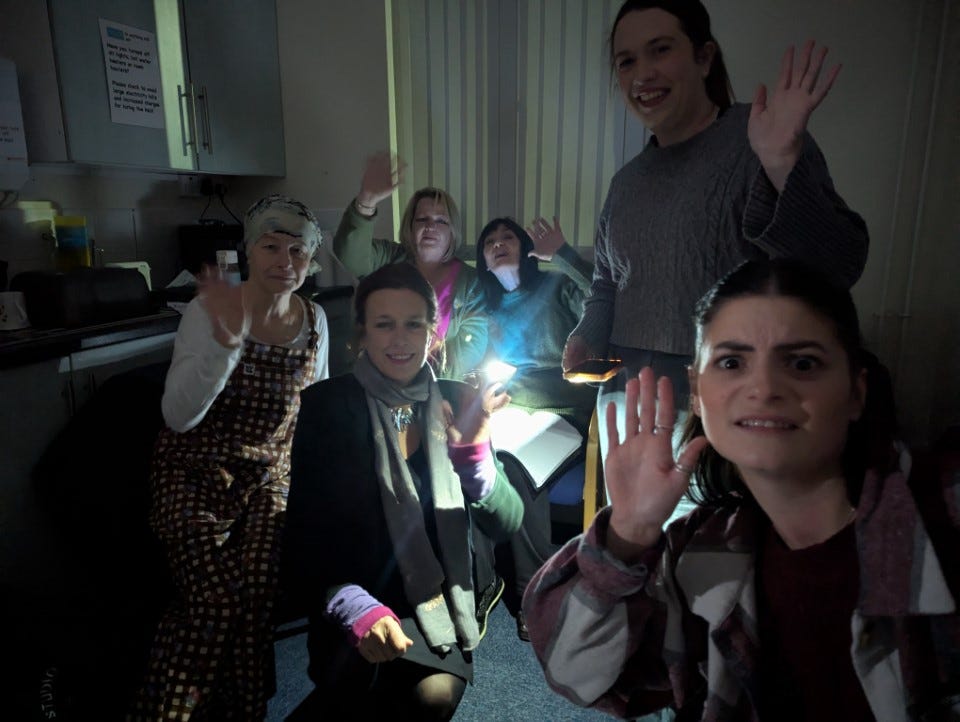
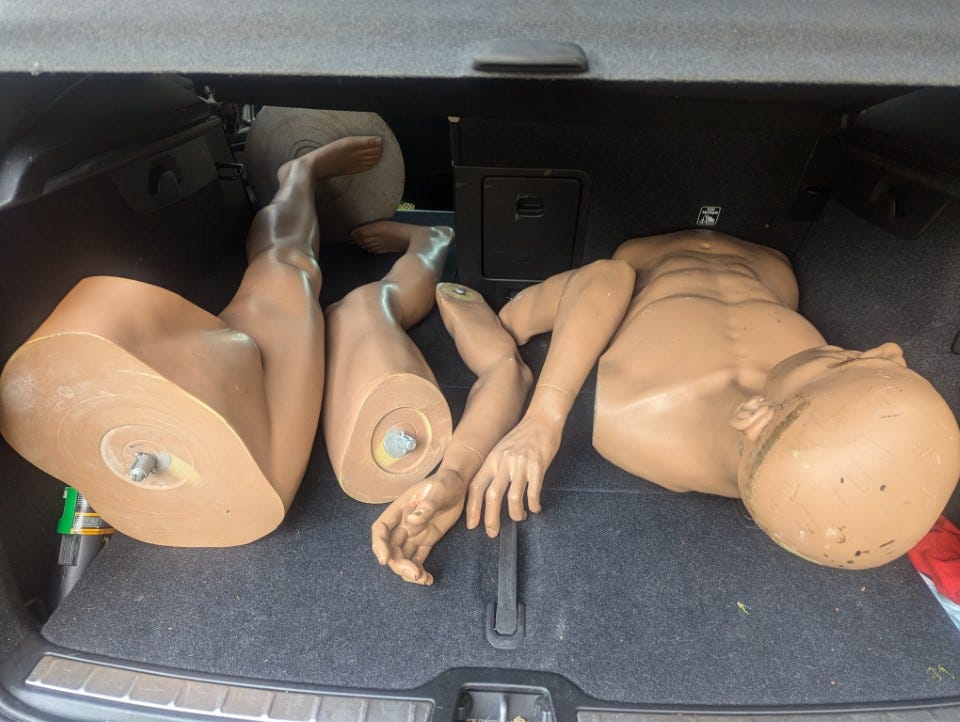
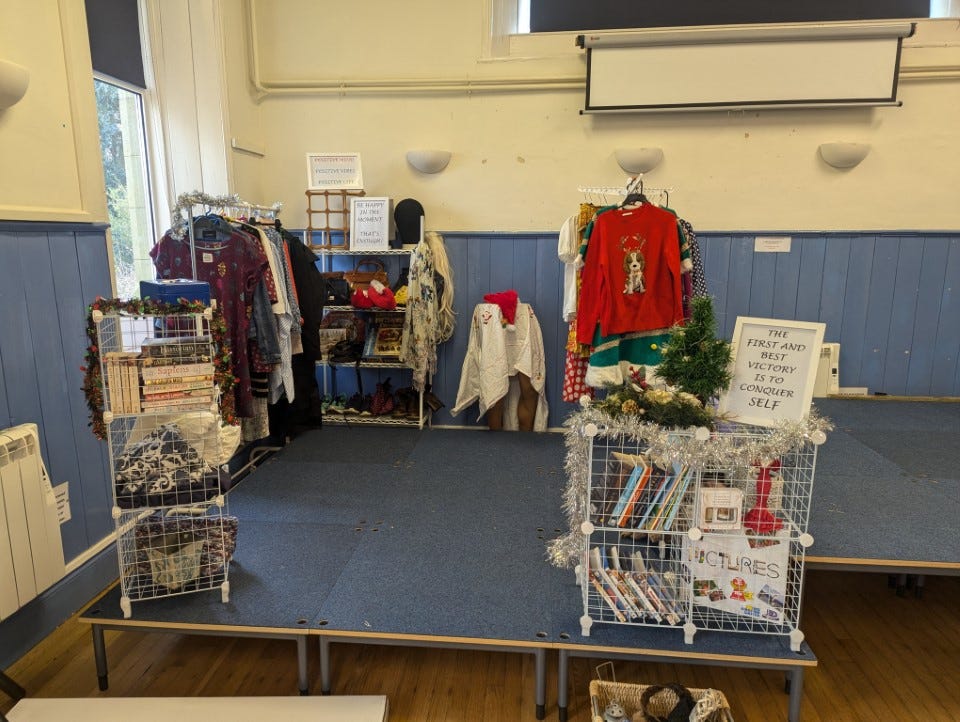


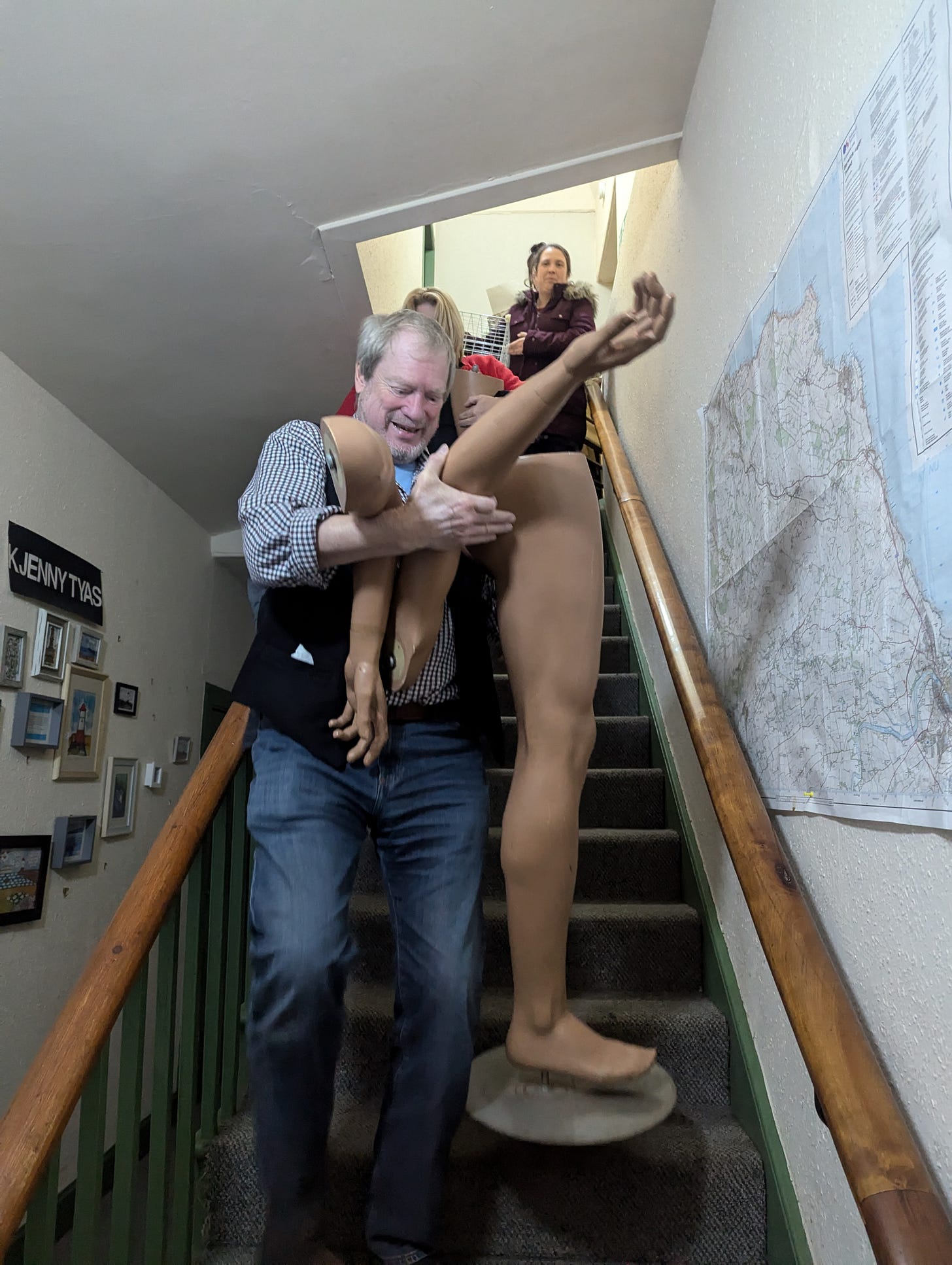
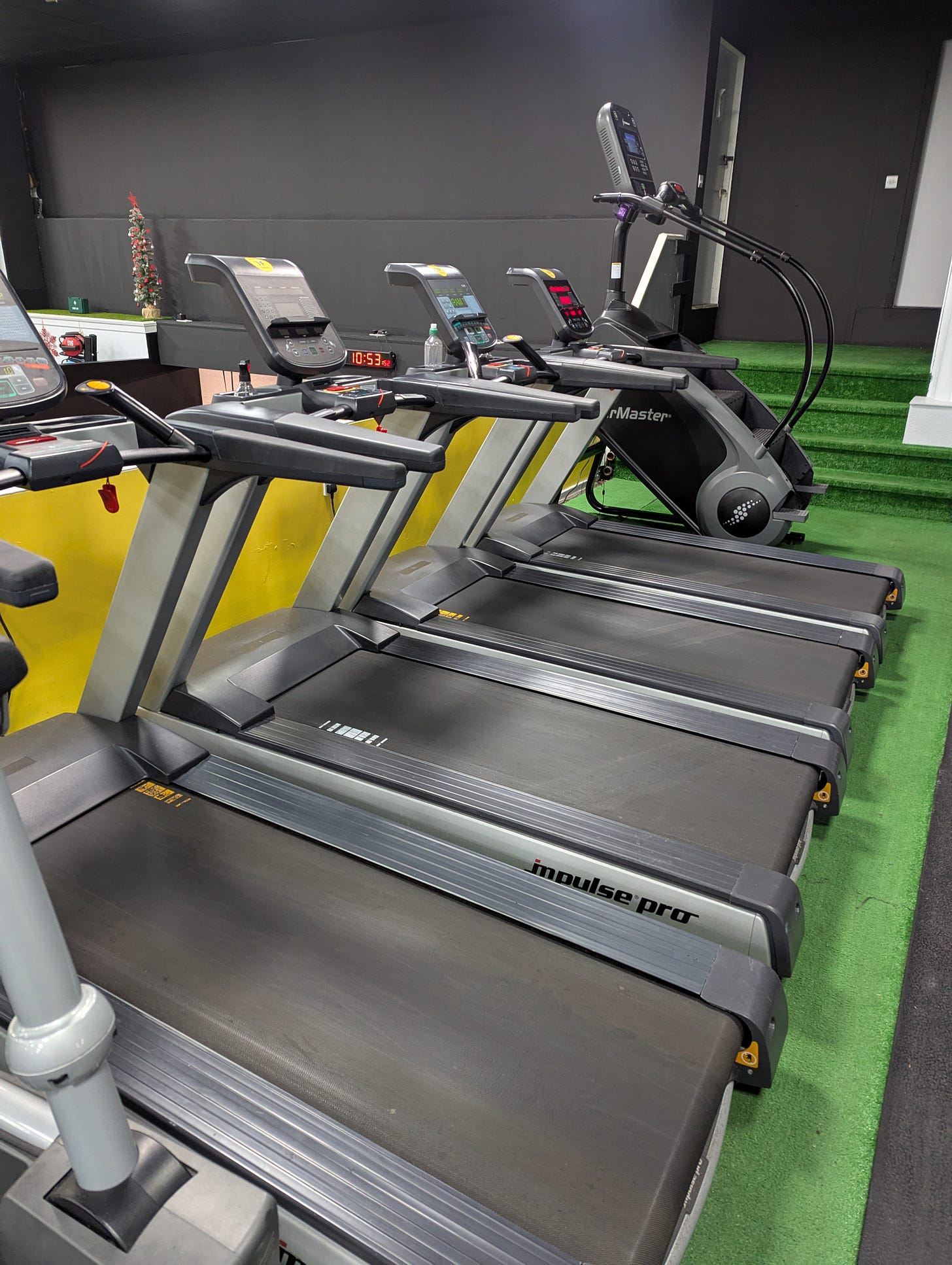


I used to be the manager for an English company’s Shakespeare tour in France, generally ten venues over twelve days. They had very very minimal scenery, maybe a ladder or a simple platform. The detail came from the costumes and the (small!) props.